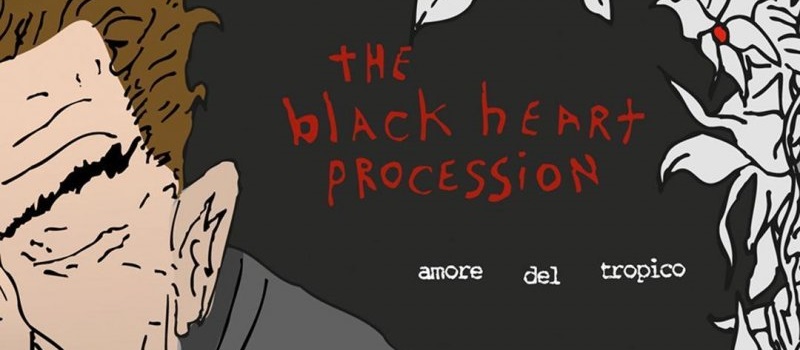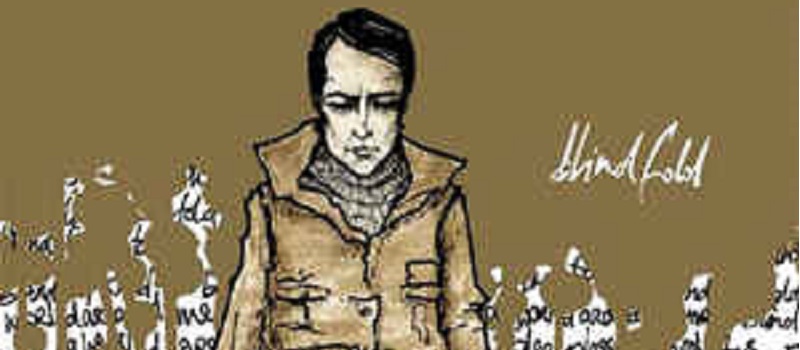It may seem like a relatively small detail that the fourth record from the Black Heart Procession is not titled 4, but don’t be fooled. It’s a detail that speaks volumes. And, after releasing records titled 1 (in 1998), 2 (in 1999), and Three (in 2000), the title is not the only thing that distinguishes the band’s latest offering from its musical predecessors.
Amore del Tropico is, in many ways, classic Black Heart Procession. The strained, almost achy voice of Pall A. Jenkins — here credited as Paulo Zappoli — still floats mere inches above his guitar, surrounded by creeping bass lines and punctuated by piano and off-kilter percussion. But anyone looking for a replication of Three should look elsewhere. If it’s one thing the band seems to be out to prove this time around, it’s that they can write more than heart-wrenching funeral dirges or pensive post-rock ballads about heartbreak and loss.
The tone of the record is announced quickly: after a brief instrumental introduction, the band launches into “Tropics of Love,” a colorful pop song set to an exotic bossa nova back-beat and complete with violin, cello, and three backup female vocalists. It’s almost impossible not to tap your foot in time with the music. A few songs later, the almost throttling guitar and drum attack of “Did You Wonder” makes the entire band sound engaged in their work in a way they never quite have before. You can almost see Tobias Nathaniel aggressively pounding away on the keys of his piano as Zappoli’s voice trembles slightly when he sings, “Did you ever wonder why we bother sometimes?”
Throughout the record, the material — which is inventive without sounding insincere or forced — keeps you on your toes. The guitars on “A Cry for Love” border on early doo-wop and are complemented by strings and trumpet, not to mention, again, the interjected harmonies of female voices. “Before The People” begins in a familiar vein, with spare and drifting notes on both a piano and electric guitar but is quickly picked up and thrust forward by an aggressive and distorted drum line. Just as it builds to a peek, the guitars and drums fall away for Zappoli to moan, “There is a silence inside.” The band pulls out similar stops on “Only One Way,” a straight-forward rock number that cuts to a jagged, clattering chorus where the only thing you can hear between hits to the guitar is someone forcefully breathing.
Near the end of the record, the band abandons the more tight rock structures of these songs for “Fingerprints.” A dark musical companion to the record-opening “Tropics of Love,” “Fingerprints” creeps and slithers along, again relying on female backing vocals, an exotic drum line, and distorted violin.
However, while Amore del Tropico blazes some new paths for Black Heart Procession, it also hits all the right notes from the group’s past. “The Invitation” and “A Sign on the Road” rank among some of the finest material that the band has recorded to date. Fragile but forthright, the songs are driven by piano, deceptively understated drums, and the lingering, reverb-soaked notes of an electric guitar. The association with similar works on 2 and Three is clear; “The Invitation” begins with a sound clip — possibly a phone conversation — where someone says, “Well, I sure like those old ones. I hope they’re similar.”
Those who have sought out all of the band’s recordings will also be more than pleased with Amore del Tropico‘s re-working of “The Waiter.” Titled, appropriately enough, “The Waiter #4,” the song takes on a more carefully composed form than it has in the past, elevating what was once pensive and somber to something that resonates as much more elegiac. “This is you and this is me,” moans Zappoli, whose voice is carefully multi-tracked over subtle waves of incidental sounds. “No one understands,” he adds, his voice becoming slowly engulfed by the soft moans of a cello and the Black Heart Procession’s trademark musical saw.
In a record filled with both familiar comforts and bold, new soundscapes, it’s a fitting reminder that, despite a change in the way they name their records, the Black Heart Procession has never been better. – Delusions of Adequacy, Feb. 10, 2003




